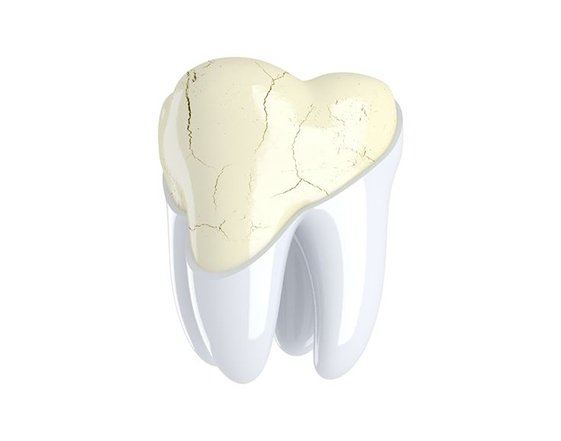When you smile, your teeth are on full display, reflecting not only your oral hygiene but also your overall well-being. One of the key components responsible for that radiant smile is tooth enamel. Often referred to as the “guardian” of your teeth, tooth enamel is an incredible substance that plays a crucial role in maintaining dental health. In this article, we delve into the science of tooth enamel, exploring its composition, functions, vulnerabilities, and how to care for it.
Composition of Tooth Enamel: A Remarkable Structure
Tooth enamel is the outermost layer of the tooth crown, and it’s considered the hardest substance in the human body, even tougher than bone. It’s primarily composed of hydroxyapatite, a crystalline structure made of calcium and phosphate ions. This intricate lattice-like arrangement gives enamel its strength and durability, enabling it to withstand the forces of biting and chewing.
While hydroxyapatite is the main component, tooth enamel also contains trace amounts of other minerals like fluoride, carbonate, and magnesium. These minerals contribute to the overall hardness and resilience of enamel, making it highly resistant to wear and tear.
Functions of Tooth Enamel: More Than Just Aesthetic
Beyond its aesthetic appeal, tooth enamel serves several vital functions:
- Protection: Enamel acts as a protective shield, preventing bacteria and acids from reaching the sensitive inner layers of the tooth, such as dentin and pulp. This safeguarding role is crucial in maintaining the health of teeth.
- Biting and Chewing: Enamel’s hardness enables teeth to effectively bite and chew a variety of foods. Without enamel, teeth would be susceptible to damage and erosion.
- Thermal Insulation: Tooth enamel helps insulate teeth from extreme temperatures, protecting them from sensitivity when consuming hot or cold foods and beverages.
- Aesthetic Value: The bright, white appearance of enamel contributes to the attractiveness of a smile, making it an essential factor in our perception of dental beauty.
Vulnerabilities and Erosion: Protecting Your Enamel
While tooth enamel is exceptionally durable, it’s not invincible. Several factors can lead to enamel erosion, compromising the health and appearance of teeth:
- Acidic Foods and Drinks: Consuming acidic foods and beverages, such as citrus fruits, sodas, and certain sports drinks, can weaken enamel over time.
- Poor Oral Hygiene: Inadequate brushing and flossing can lead to the buildup of plaque and tartar, which contain harmful bacteria that produce acids that erode enamel.
- Bruxism: Teeth grinding or clenching can wear down enamel, leaving teeth more susceptible to damage and sensitivity.
- Medical Conditions: Some medical conditions and medications can contribute to enamel erosion, such as acid reflux and certain eating disorders.
Caring for Your Tooth Enamel: Tips for Healthy Teeth
Maintaining strong and healthy enamel is vital for overall oral health. Here are some tips to help protect your enamel:
- Practice Good Oral Hygiene: Brush your teeth at least twice a day with fluoride toothpaste, and floss daily to remove plaque and food particles from between your teeth.
- Balanced Diet: Consume a well-balanced diet rich in fruits, vegetables, dairy products, lean proteins, and whole grains. Limit your intake of sugary and acidic foods and drinks.
- Use a Straw: When drinking acidic beverages, using a straw can help minimize contact between the liquid and your teeth.
- Regular Dental Checkups: Schedule regular dental visits for professional cleanings and checkups. Your dentist can identify early signs of enamel erosion and provide guidance on maintaining your oral health.
- Fluoride Treatment: Fluoride helps strengthen enamel and can be found in toothpaste, mouth rinses, and even tap water. Your dentist may recommend fluoride treatments if needed.
- Night Guards: If you have bruxism, wearing a night guard can protect your teeth from the effects of grinding or clenching during sleep.
In conclusion, tooth enamel is a remarkable and indispensable component of your oral health. Its strength, resilience, and protective functions contribute to the longevity of your teeth and the beauty of your smile. By understanding the science of tooth enamel and adopting proper oral care practices, you can ensure that your enamel remains strong and your smile remains captivating for years to come.

